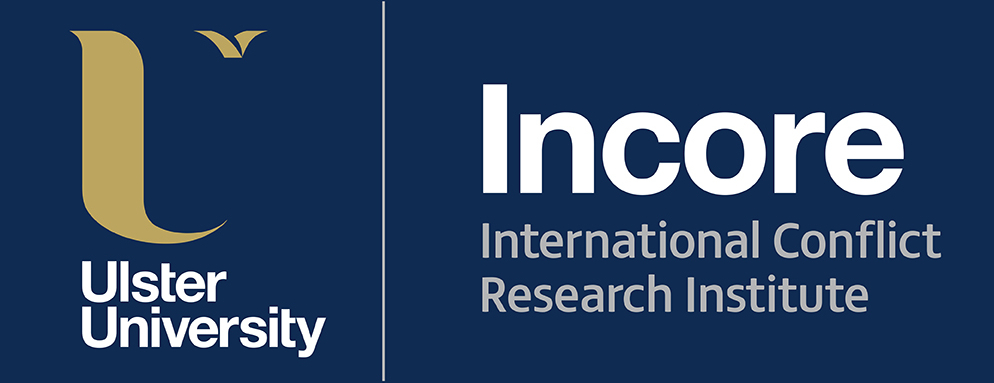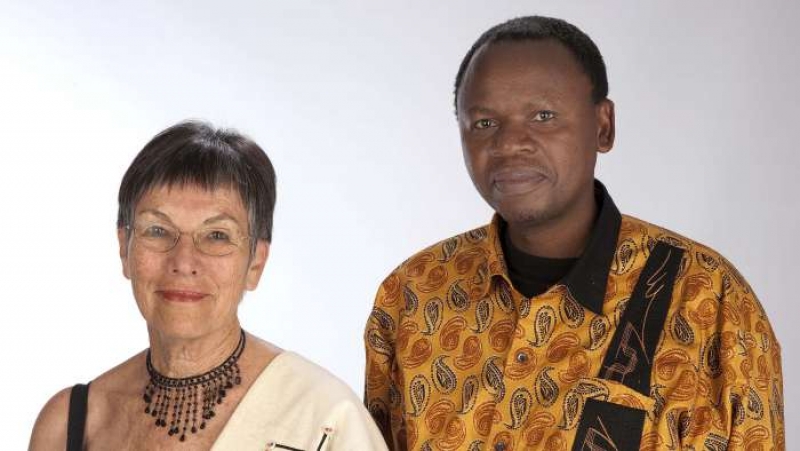Below is a guest post from two of INCORE’s interns, who reflect personally on the screening of Beyond Forgiving and the subsequent Q&A session.
In cooperation with Initiatives of Change, The Wilderness Foundation, and Healing Through Remembering, Accounts of the Conflict (INCORE; University of Ulster), hosted the last stop of the UK screening tour of the award winning documentary ‘Beyond forgiveness’. The event took place in the Duncain Centre for culture and arts on the 30th of May. The former Presbyterian Church, located in North Belfast, presented a perfect location for Ginn Fourie and Letlapa Mphahlele from South Africa to talk about their extraordinary personal journey following the screening.
The documentary is about the lives of Ginn and Letlapa, who demonstrated great courage by moving from victimhood to survivor and healer. In 1993, Ginn’s daughter Lyndie was killed in an attack on a restaurant in Cape Town that was green lighted by Letlapa. At that time, he was a commander of The Azanian People’s Liberation Army (APLA) that wanted to retaliate for the killing of five black school children. Instead of going for formal justice and revenge, Ginn found an enormous strength in herself to see her personal tragedy in a broader perspective and started to think about forgiveness. When she met Letlapa nine years later, Ginn was able to forgive him and acknowledged the wrongdoings of the white settlers in South Africa that caused inequalities within South African society. Today, Ginn and Letlapa are not only friends but also directors of the ‘Lyndie Fourie Foundation’ working on peacebuilding in South Sudan and youth empowerment.
‘Beyond forgiving’ is a powerful demonstration of storytelling, courage, and forgiveness. Despite many understandable reasons to hate each other, Letlapa and Ginn found a way to move forward. In the question and answer session following the screening, they both emphasised that the reason why they were able to undertake this journey was that ‘Forgiveness is something we all long for’. Relating to the parallels between Northern Ireland and South Africa, Letlapa pointed out that ‘history is just in process (…) we cannot wait for politicians or leaders to make the decisions and pave the way. It is the chance for each and every one of us to take part in the on-going processes of change’. Ginn and Letlapa highlighted two reasons why this is so significant. First of all, it is important for oneself because ‘forgiveness is about the restoration of humanity’. Ginn described her own personal feelings changing from numbness and anger, because she couldn’t understand why her daughter had to die, to regaining her agency and humanity by ‘following her heart’. The second reason is related to the next generation because ‘pain that is not transformed is transmitted’.
Two further difficult issues were raised by the audience – the first was about the feeling of betrayal of the cause and people close to them. However, neither Ginn nor Letlapa felt they were betraying their people. Ginn mentioned that Lyndi was always committed to an inclusive South Africa and how she wouldn’t like to see more violence. Letlapa acknowledged that he was accused by former combatants of being a traitor. Nevertheless, he is convinced that in his current position, and through non-violent means, much more change can be achieved. The second issue raised was in connection with Northern Ireland and the feeling that the Protestant community has a fear of being marginalised. Both Ginn and Letlapa objected to this perception, and added that it would be a shame to see it through this lens. Both communities should rather think of themselves as one big community and not in terms of loss and gain.
‘Beyond forgiving’ and the life stories of Ginn and Letlapa are powerful examples how the quest for reconciliation and forgiveness can make an enormous difference. The personal reflection and discussion afterwards provided an opportunity to reconsider some personal beliefs of how to deal with the past. All in all, the event presented an inspiring discussion about the possibilities of healing and reconciliation in post-violence societies.
Florian Prommegger is a postgraduate student at the University of Kent and currently works as an intern at INCORE.
Alena Márová is a postgraduate from the Czech Republic, currently studying at Utrecht University. She has worked as an intern at INCORE for the past three months.
- Closing Remarks - 3rd December 2014
- Conference: 17-18 November 2014 - 14th November 2014
- Conference: Less Than a Week to Go - 13th November 2014






